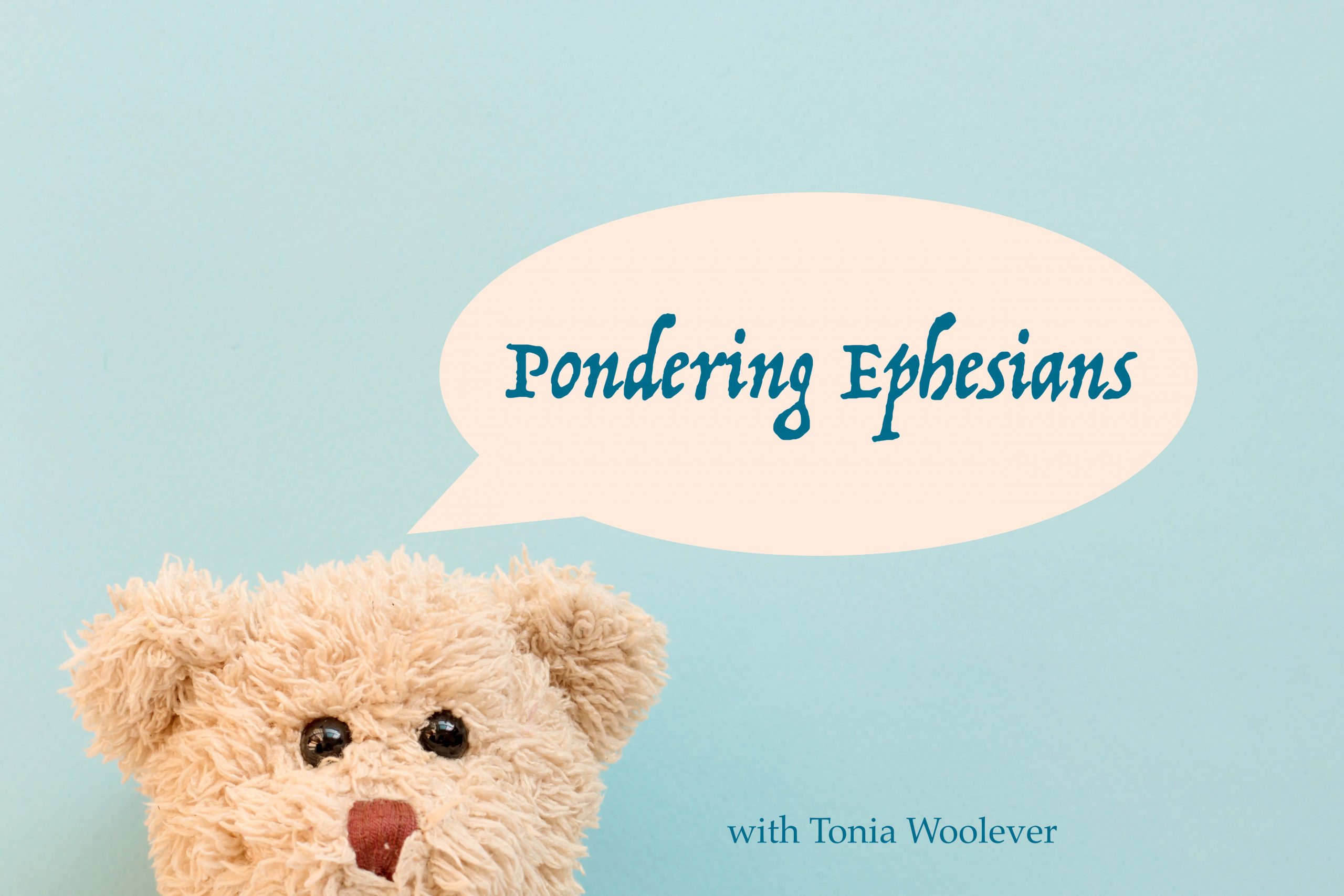
There is no shortage of mysteries to ponder in God’s Word! Heavenly things and invisible things are always mysterious to earthlings staring at a toaster. Mysteries about what God holds out to us must be taken in faith until we understand them. Such a mystery is in the words of Apostle Paul in Ephesians 2:6:
And God raised us up with Christ and seated us with him in the heavenly realms in Christ Jesus….
Frankly, I didn’t quite know what to do with this grand truth in my Christian infancy. I believed it, but I didn’t understand it.
That changed when I learned about Covenant. Learning the principles of Covenant connection, and how God governs all His relationships by them, opens up many mysteries. Covenant offers context for much of what Christians struggle to understand about God’s motives, actions, and declarations. Covenant explains how you can be walking this earth, yet sitting with Christ in heavenly places, at the same time.
This important truth is a mystery you need to understand. We crack open the door of understanding by learning some of the basics of covenant relationship. First, know this:
The goal of covenant relationship is ONENESS, a shared life.
In a covenant ceremony, two souls do more than pledge their lives to each other. They promise to live henceforth from the vision of, and a commitment to, a shared life. This requires a conscious surrender of one’s heart, wealth and priorities to the other. It is not a surrender that results in slavery; it is a gladly given gift of all one is, and all one possesses.
Marriage between a man and a woman is the most common example of covenant in our modern midst. The result of covenant is revealed in the friendship of David and Jonathan (@ 1 Samuel 1:1) : …the soul of Jonathan was knit to the soul of David, and Jonathan loved him as himself.
The heart of covenant commitment is expressed in the pledge of Ruth the Moabitess to Naomi, her Jewish mother-in-law. Ruth speaks a covenant language all primitive cultures understood:
Do not urge me to leave you or turn back from following you; for where you go, I will go, and where you lodge, I will lodge. Your people shall be my people, and your God, my God. Where you die, I will die, and there I will be buried. Ruth 1:16-17 (NASB)
As God conceived of it, and mankind practiced it from the beginning, covenant is a relationship for life. A covenant relationship can end honorably only by the death of one party.
So what does this have to do with Paul’s assertion in Ephesians 2:6 that we are seated in heavenly places with Christ? The answer to this begins with a phrase Jesus spoke to His disciples at their last Passover together:
I am in you, and you are in me.
Where did that come from? It came from ancient covenant ceremonies in which two parties sealed their lives together before witnesses. The ceremony usually concluded with a shared meal, typically bread and wine. Each party would feed the meal to the other while declaring, “This represents my body, and my blood. I am now in you.”
Thus each party confirmed their union with some version of the phrase, I am in you and you are in me. We are one.
This is the vision, or point of view, from which covenant makers chose to live. Their declaration was both a statement of faith and a commitment to this vision. Again, the whole point of it all: to become and live as one in the journey of life. Belonging to one another. Obligated by love and choice. Committed through thick and thin. Fully giving themselves to each other; to the care, nurture and protection of the covenant other. Maintaining their distinct personalities, yes, but ceasing to live as if it is only all about their self. To enter covenant with another was a commitment to consider their welfare in all your behavior and choices. Lived to the full, this commitment challenged all selfishness.
Your Bible is packed with stories illustrating these principles being played out between men, nations, and God Himself.
Covenant practice is the common backdrop to every story in the Bible.
Our Jesus grew up in a covenant-saturated culture. Thus, certain expressions we find baffling today were entirely familiar to his audience. They needed no explanation.
Covenant is woven into the entire history of God with man. For instance, the Passover meal commemorates God keeping His covenant promise to deliver His people from slavery in Egypt.
Jesus drew on this familiarity with covenant when He announced to His disciples at His last Passover meal — known as “the last supper” — that going forward, the meal would become the symbol of the New Covenant. As He broke the bread and shared the wine, Jesus departed from the traditional words. He declared, “This is my body given for you; do this in remembrance of me…” and, “This cup is the new covenant in my blood, which is poured out for you.” Luke 22:19-20 (NIV)
The disciples likely understood His meaning. However, their concept of covenant oneness surely clashed with their increasing awareness that Jesus was the true Son of God. A union between men was one thing; how could man be one with God Himself?
But this was the exact intent of Jesus. We know because He drove the point home that evening, revealed in John’s account of this moment:
I will ask the Father, and He will give you another Helper, that He may be with you forever; that is the Spirit of truth, whom the world cannot receive, because it does not see Him or know Him, but you know Him because He abides with you and will be in you.
John 14:16-17
Here, our Western-trained minds usually focus on news of the Helper, Comforter, the Spirit being sent to abide with us. Yes, this is BIG news! But I think the bigger news unfolded in Jesus’ next words, when He connected the Spirit’s indwelling with God’s covenant commitment to share life with them:
I will not leave you as orphans; I will come to you. After a little while the world will no longer see Me, but you will see Me; because I live, you will live also. In that day you will know that I am in My Father, and you in Me, and I in you.
John 14:18-20 (NASB)
To make sure they understood the incredible thing He was announcing, Jesus used language they recognized in covenant making: “you are in me, and I am in you.”
If you’re one of those disciples in that moment, you might have felt like your head was going to explode. Jesus has worked hard to convince you He is the Son of God. Could you, in that moment, get past this question:
Can man and the Living God have such a union?
Mankind has struggled with this question ever since. Based on how the disciples behaved through the crucifixion and even Jesus’ resurrection, it is clear they could not truly imagine it. Their longstanding religious system emphasized the impossibility of true life-sharing between a holy God and flawed, sinful man. And God Himself had designed that system, also characterized as a covenant, and exhaustively explained it through Moses. It was unthinkable to entertain any kind of deviation from this Old Covenant.
The disciples lived in gratitude for the sacrificial system which offered the grace of being accepted by God in spite of their state. They believed in a certain favor with God; but all at a proper distance. Every Jew lived aware of the need for that separation and feared they would defile God’s holiness. The Priesthood had always served as a vital connection between them and God, and as a necessary wall of mutual protection — God stayed holy, and they didn’t go up in flames in His vicinity. The whole arrangement was, itself, God’s Covenant with His people under Moses.
But now Jesus implies that all that separation will fall away.
Jesus states, incredibly, that they will be IN God and God will be IN them, in the way of all man-to-man covenant makers. The implication is that they will entirely belong to one another and share life in every part. (In such a union, each will inherit all the life and wealth the other possesses. This is why the Apostle Paul uses the word inheritance in His Ephesians letter.)
Clearly, the disciples struggled greatly with this idea at first. Jesus probably spent much of His forty days (post-resurrection) teaching them about the immense paradigm shift now made possible by their total cleansing from sin. His life, death and resurrection became a perfect illustration of dying to one’s life in order to live a new one for the sake of the other.
Their covenant oneness had begun. It began, as all covenant life does, with each party dying to their former life, and being resurrected into a new life that belongs to them together. The resurrection of Jesus is not merely a demonstration of His power over death; it is a guarantee of His ability and commitment to enable you to share in His life.
God is with you in your life, now and forever. You are with God in His life, now and forever. Therefore, where Christ resides now, seated next to the Father in His heavenly realm, you are with Him.
Like all Bible writers, Paul understood covenant principles and covenant language. In stating that we are now seated with Christ in the heavenly realms, Paul affirmed our new reality: that because we are one with Christ in the New Covenant, we are WITH Him wherever He is. To make it simple, think of the covenant we call marriage. If you are married, you are one with your spouse, no matter where each of you are physically. Your souls and spirits are intertwined, knit together.
Paul wants the church to see herself in this way. He wants you to know how inseparable you and your Jesus truly are. Covenant explains the mystery of being seated with the Lord in heavenly places, while we yet live on earth.
Wherever you are, Christ is with you.
He is in you. Jesus didn’t just ask us to put faith in His promise to be one with us; He sent His Spirit to live in us. His Spirit dwells in you as His covenant commitment to never leave you or forsake you. You are in Him, and He is in you. Your life is intertwined with His, no matter how you feel, whether you’re behaving good or badly. Every New Testament writer points us to this news, and urges us to live worthy of this glorious truth.
In fact, Paul laid the groundwork for this statement earlier in his letter with a bit of typical parallelism. In Ephesians 1:20, Paul says God raised Christ from the dead and seated Him at His right hand in the heavenly places. Four sentences later he draws the parallel beginning in Ephesians 2:1: And you were dead in your trespasses and sins…. (as Jesus was once dead) — but because God raised Christ and made Him alive, you are also made alive together with Christ… and raised up with Him, seated with him in heavenly places. Simply put:
Where Christ is, you are.
Where you are, Christ is.
Ephesians 2:4-6
Now, it’s likely you don’t have the same view from that high place that Christ has. You probably aren’t feeling the power and authority He possesses in that place. Yet you are, in covenant, invited to presume you share in those things; indeed called to live from that place as you dwell on earth. Never forgetting, of course, that Christ is the head.
The point of all this is to help you truly believe in covenant oneness.
When you believe this as your reality in Christ, you will come to enter rest in your soul and spirit. Let faith in your covenant oneness with Christ destroy all insecurity about your relationship to Him.
That’s what understanding this mystery did for me. Understanding this covenant and commitment of God, this reality, shattered forever my sense of being apart from God. It dissolved all my fears of unworthiness. Of course, I’m not worthy to share life with God, but God made that irrelevant! He stepped over that, chased me down and laid down His life, so we could have a new life together.
Faith in your covenant oneness should remove all doubt that God hears your voice, and you hear His.
Faith in the New Covenant should establish your permission to live near God and believe He is near you. You not only have permission, you have His covenant commitment to offer His life-giving nurture and guidance. Tons of Scripture exist just to convince you of these things. You should believe!
Faith in your covenant oneness gives you all the permission you need to act as His agent in the earth. You can use His name. You can declare His truth, with His authority. You can, in His name, tromp on the devil and his schemes. Being one with Christ, you are seated with Him in that place of authority and victory over sin and evil.
Faith in your covenant oneness — you in Christ and Christ in you — strikes down every barrier of unworthiness. Faith invites you to receive the wealth of spirit and life God holds out to you as your covenant other.
Covenant is the key to many mysteries in God’s Word.
The veil of mystery is lifted as you believe the covenant pledge of Jesus:
This cup is the new covenant in my blood. (1 Corinthians 11:25).
In the same way your soul/spirit tie to your spouse, parents or children defines your life whether physically together or not, so is your relationship to God the Father, Jesus the Son and the Holy Spirit. Like Jonathan and David, your spirit is knit together now with God’s.
This is true even if you don’t believe. But when you truly believe, mysteries give way to promises being fulfilled.

Tonia’s book reveals the life God offers every believer through The New Covenant of Christ.
Available in Tonia’s store in paperback, or on Amazon as a Kindle ebook and in paperback.
Related Posts
Christian, Draw Near To God, Because You Can
Today I am pondering Hebrews Chapter 7, and one special phrase in the following passage …









Leave A Comment